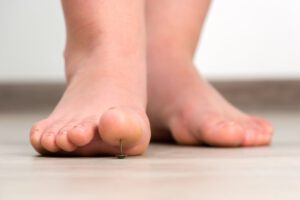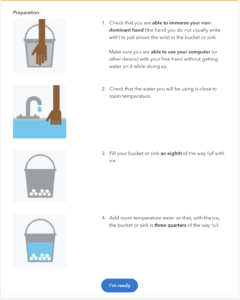Everybody hurts, but we all hurt a little differently because pain and how we perceive it is both complex and personal.
That makes studying and treating the intricacies of pain and chronic pain difficult.
In collaboration with scientists from the German-based pharmaceutical company Grünenthal, 23andMe has been conducting a pain study and researching chronic pain, as well as the role genetics plays in it all.
Cold Pressor Test
For that work, we developed an online version of a known experimental pain test and used a clinically validated pain sensitivity questionnaire to gauge pain thresholds and tolerance.
During the online procedure, we ask some 23andMe customers who consented to participate in the study to place a hand in icy water for up to three minutes. This “cold pressor test” helps to gauge pain sensitivity, as does the questionnaire where participants need to imagine painful situations.
Online Pain Study
Using these two online methods allows for more accurate comparisons of pain perception between individuals. The researchers succeeded in this crucial step for studying the genetic differences in how individuals experience pain. A paper on this online “pain testing@home” was published this week in the journal Plos One.
“The success of using these online measures is really encouraging because it makes genetic research on pain much more feasible and scalable,” said Matthew H. McIntyre, Ph.D., a 23andMe senior scientist and the lead author of the study.
While we each understand our own levels of pain, it’s much harder to understand it in others. Those individual differences in both perception and tolerance of pain, also make it difficult to find treatments that work. Identifying the genetic associations for pain may help in identifying ways to treat it better.
“Our new paradigm testing@home will help advance genetic research into personalized treatments for pain,” said Achim Kless, Ph.D., a co-author, and Scientific Director and Principal Translational Scientist at Grünenthal.
Complexity of Pain
Beyond developing better ways to treat pain, the study could also shed more light on the complexity of chronic pain, a persistent menace experienced by an estimated 50 million people in the United States alone.
For this study, scientists included data from more than 30,000 23andMe customers who consented to participate in research. More than 8,000 of those participants administered the cold pressor test on themselves. The participants reported the results through a web-based interface custom-designed by 23andMe. The questionnaire was an online version of a clinically validated pain sensitivity questionnaire usually given on paper. It asked participants to rate imagined pain situations such as burning their tongue, or stubbing a toe, or getting a sunburn.
The study found differences between men and women. Men have a higher threshold for pain. This finding was also something observed in clinical pain studies carried out under health care professional supervision. The researchers now hope to identify individuals who are either much more or much less sensitive to pain. The hope is to identify the genes that cause those differences. This, in turn, will help in identifying potential drug targets for treating pain.



